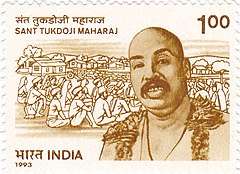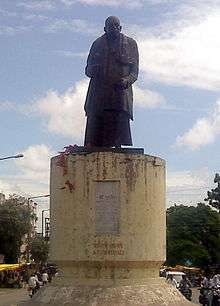Tukdoji Maharaj
Tukadoji Maharaj (30 April 1909 – 11 October 1968) was a spiritual saint from Maharashtra, India. He was born in 1909 in a poor family in the village of Yavali in Amravati District of Maharashtra. He was a disciple of Aadkoji Maharaj. Tukdoji Maharaj was involved in social reforms in the rural regions of Maharashtra, including construction of roads. He wrote Gramgeeta which describes means for village development. Many of the development programs started by him have continued to work efficiently after his death. He was once even claimed as a mad by one of the British officers.
Tukdoji Maharaj | |
|---|---|
 Tukdoji Maharaj on a 1995 stamp of India | |
| Born | Manikdev Banduji Ingale (Bhaat) 30 April 1909 Yawali (Shahid), Amravati, Maharashtra |
| Died | 11 October 1968 (aged 59) Gurukunj Ashram, Amravati, India |
| Nationality | Indian |
| Other names | Rashtrasant |
Notable work | Gramgeeta, Geeta Prasad |
| Title | Rashtrasant |

Tukdoji Maharaj once attended a World Religions and World Peace Conference in Japan.
Biography
Saint Tukdoji Maharaj was born in Yawali, Maharashtra. He received spiritual initiation from Samarth Adkoji Maharaj of Warkhed gram. Early in childhood, Saint Tukdoji Maharaj performed rigorous penance and spiritual exercises in self-realisation. He also was a great orator and a musician who composed more than 3000 bhajans (spiritual poems) in Hindi and Marathi, having performed for the spiritual teacher Meher Baba in 1937[1] and 1944.[2] He has also written many articles on Dharma, society, nation and education.
He studied the existing religious sects and other schools of thought and discussed religious and secular problems of the devotees. He was determined to re-define socio-Spirituality and revitalise and awaken the nation.
Work
In 1941 Tukdoji Maharaj performed individual satyagrah and he took part in the mass upsurge of the 'Quit India' movement. He strongly opposed the inhuman repressive measures, adopted at that time by the British rulers. He was arrested in 1942 and was imprisoned in Nagpur and Raipur Central Jails. After the dawn of Independence, Sant Tukdoji concentrated on rural reconstruction. He established the 'All India Shri Gurudev Seva Mandal' and developed many programmes for integrated rural development. His activities were so impressive that, Dr. Rajendra Prasad, President of Bharat at that time, bestowed the title of 'Rashtrasant' on Him.*
He was one of the founder Vice Presidents of Vishwa Hindu Parishad. He worked on many fronts for National cause—at the hour of the Bengal famine (1945), at the time of the China war (1962), and aggression of Pakistan (1965), the Koyna earthquake devastation (1962). Rashtra Sant Tukdoji Maharaj went with His mission to help the affected and organised constructive relief works.
He took part in Acharya Vinobha Bhave's Bhudan Movement. He attended the World Conference of Religion and World Peace in Japan in 1955. His wisdom lives on in His 'Gram Gita' which provides inspiration for village development and National reconstruction. He worked hard to convert devotion to God into service to mankind and the Nation. He transformed a traditional prayer Organisation into disciplined, broad based groups of devout young men and women who engaged in constructive social works. He left his mortal body on 11 October 1968. Rashtra Sant Tukdoji Maharaj's Jayanti falls on 30 April. We pay obeisance to this son of the soil who combined devotion and action to bring about changes in the society. he was great man.
Honors
The postal department of India had honored Tukdoji Maharaj by issuing a commemorative stamp in his name. Former Nagpur University is renamed as "Rashtrasant Tukdoji Maharaj Nagpur University" in his honor.
Books written
- Gramgeeta (in Marathi; later translated by others in English, Hindi, Urdu, Gujrati, and Sanskrit.)
- Sartha Anandamrut
- Sartha Atmaprabhav
- Geeta Prasad
- Bodhamrut
- Laharki Barkha Part 1, 2 & 3
- Anubhav Prakash Part 1, 2 and 3
Popular culture
- A short documentary depicting life of Tukdoji Maharaj was directed by Amoly Raut.[3]
- A play titled "Rashtrasant Tukadoji" was written and directed by Manoj Bhishnurkar.
- A short film titled "Tukadyadas" depicting childhood life of Tukadoji Maharaj was written and produced by Manoj Bhishnurkar.
- Jeevanyogi, his biography, was written and published by his follower Sudam Sawarkar in the year 1990.
References
- Kalchuri, Bhau (1986). Meher Prabhu: Lord Meher. Myrtle Beach: Manifestation, Inc. 7. p. 2255.
- Kalchuri, Bhau (1986). Meher Prabhu: Lord Meher. Myrtle Beach: Manifestation, Inc. 7. p. 2986.
- "Rashtrasant" on YouTube
External links
| Wikimedia Commons has media related to Tukdoji Maharaj. |